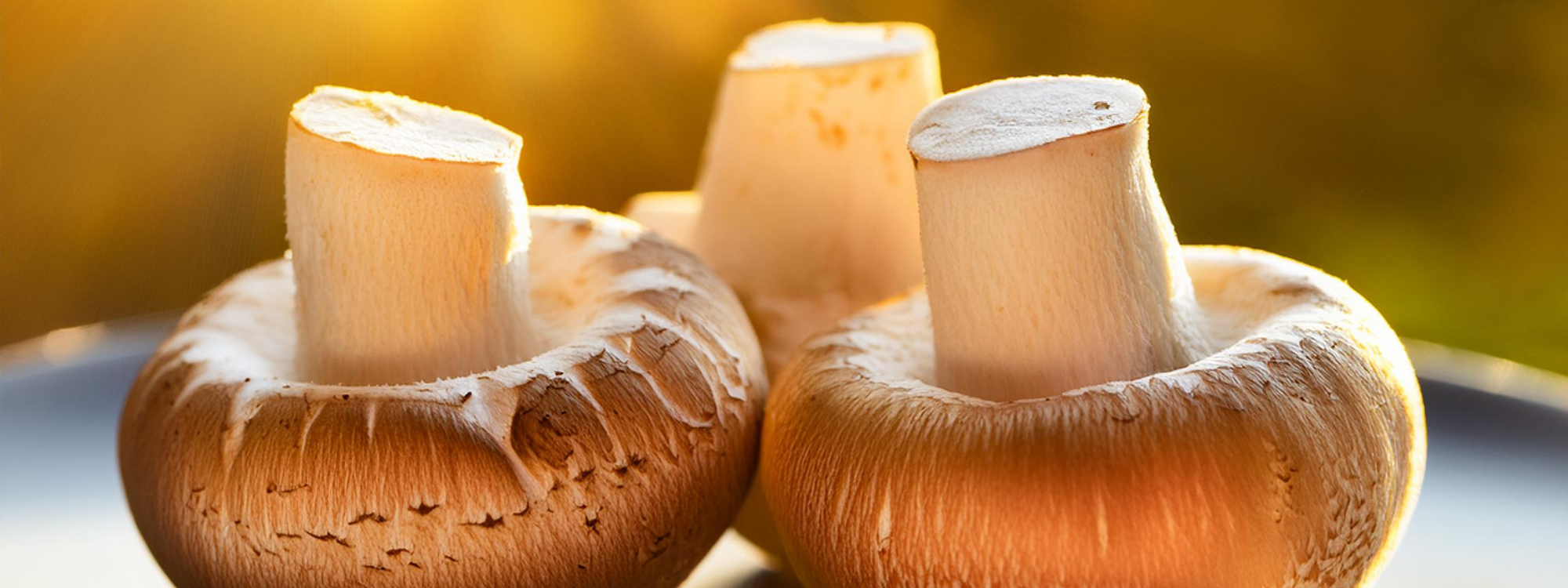
‘Vitamin D mushrooms’ – a food-based solution to
Aussies’ vitamin D deficiency: world-first research
Consuming around three sun-exposed, store-bought mushrooms, four times a week, exceeds the vitamin D requirements of all Aussie adults*, new Australian research reveals.1
Release of the new research coinciding with Healthy Bones Action Week (August 12-18, 2024), urges consideration of the ‘vitamin D mushroom’ as an important food source to help address our adult population’s poor vitamin D intake, which is among the world’s lowest.1,2
According to Australian Mushroom Growers Association (AMGA) CEO, Ms Leah Bramich, Sunshine Coast, the research demonstrates vitamin D mushrooms, which are delicious and versatile, are perfectly placed to help address the one in three (31 per cent) Aussie adults who are vitamin D deficient, and the more than 95 per cent who have an inadequate vitamin D intake.1,3-5
“It’s not surprising that the majority of Australians get insufficient vitamin D from their diet, because very few foods, apart from fish and eggs, naturally provide vitamin D.
“Importantly, the levels in vitamin D mushrooms are well above what any food source contains,” Ms Bramich said.
Sunlight as a source of vitamin D is influenced by seasonal variation. Although we have many opportunities for sun exposure in Australia, skin cancer risk, skin colour, clothing, and the length of time we spend indoors and outdoors, determines our level of UV exposure.6,7
“Concerningly, vitamin D deficiency remains a serious public health issue in Australia.1,8 Yet vitamin D is the only nutrient not adequately met by the current Australian Dietary Guidelines (ADG),” said author of the new Australian research, Nutrition Scientist, Space Nutritionist, and CEO of food and nutrition science translation group, FOODiQ Global, Dr Flávia Fayet-Moore.
“The dietary modelling used to inform the Guidelines, which is more than 10 years old, failed to include vitamin D mushrooms as a potential solution.”1
Vitamin D helps absorb, and use calcium from food.9 It is essential for bone development and strength, cell growth, and maintaining a healthy immune system.9 Vitamin D is also important for healthy teeth and muscles.10
A lack of vitamin D can increase a person’s susceptibility to infectious diseases, muscle weakness, multiple sclerosis, diabetes, hypertension, metabolic syndrome, cancers, autoimmune and cardiovascular diseases.11-13
“UV-exposed mushrooms are a natural, vegan, and sustainable food source of vitamin D that align with plant-based diet trends, and offer significant amount of vitamin D,”1,14 Dr Fayet-Moore said.
“In our new dietary modelling research, we asked the question: ‘What would happen if we added vitamin D (UV-exposed) mushrooms to the ‘vegetables and legumes’ core food group in the Australian Guide to Healthy Eating, by creating a ‘mushrooms only’ sub-category?’.
*Research used Institute of Medicine (IOM) targets, demonstrating just four 75g serves per week of vitamin D mushrooms exceeded the vitamin D needs of all Australian adults aged up to 70 years.
“In a world-first, we modelled a diet able to exceed the vitamin D needs of ALL Australian adults (according to Australian vitamin D targets), without fortification, with just four serves of 75 grams of vitamin D mushrooms per week,”1 said Dr Fayet-Moore.
“Just 3-5 (100 grams) of vitamin D mushrooms per day can provide the same dose as a 1,000IU vitamin D supplement.9,14
“Research shows consuming foods rich in vitamin D can help increase vitamin D levels in people who are deficient [on a national scale],”1,15 Dr Fayet-Moore said.
“Because mushrooms are not a vegetable, nor a plant, but rather, a ‘fungi’, they sit in their own biological kingdom, and offer unique health and nutritional benefits.14 The vitamin D content of the common, sun-exposed [A. bisporus] mushrooms is well above any other dietary source of vitamin D, including oily fish and eggs per serve.1
“The vitamin D mushroom is a nutritional and culinary powerhouse, jam-packed with nutrients found across all core food groups in the Australian Guide to Healthy Eating,” said Dr Fayet-Moore.
Mushrooms contain a range of essential vitamins, minerals, and bioactive compounds, all of which provide many nutritional and health benefits, ranging from increasing vitamin D status, helping you feel full, reducing inflammation, and improving gut health, heart health and immune function.11,14,16 Mushrooms are a popular, and versatile food which complement a range of diets and dishes. They are also low in calories and sodium.11,17
“Mushrooms are always in season, and unlike plants, do not need sunlight to grow, and can be sustainably farmed,”9 said fourth-generation grower, and Premier Mushrooms General Manager, Chris Tolson, The Hawkesbury Valley.
“Mushrooms are the food of the future. They are grown on limited land areas, indoors, stacked like bunk beds, in high energy-efficient rooms. They’re a super nutritious and sustainable food source.
“Vitamin D mushrooms are available all year round, are in constant supply, and warrant consideration as a food-based solution to addressing Australians’ adults low vitamin D levels,”1 Mr Tolson said.
For more information about please visit the online media release at: https://www.mushroommediakit.com.au/
To learn more about the new Australian published research, visit:
frontiersin.org/journals/nutrition/articles/10.3389/fnut.2024.1384273/full
ends#
MEDIA INTERVIEWS & CONTACTS
To coordinate an interview with Leah Bramich, Dr Flávia Fayet-Moore or Chris Tolson, please contact:
Kirsten Bruce & Melorin Kheradi, VIVA! Communications
M 0401 717 566 | 0421 551 257
W 02 9968 3741 | 1904
E kirstenbruce@vivacommunications.com.au| mel@vivacommunications.com.au
Visit the Mushroom Media Kit
Join our Mushroom Lovers Club!
Receive delicious Mushroom recipies and much more.





